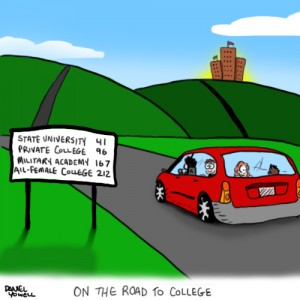 Last week, I talked about Illogical college choices; choices that college-bound teens make that have nothing to do with the quality of education. Without strong parenting and some tough love, those illogical choices might make their way onto the final college list. Be strong and remember that you are the parent and often they need a slight dose of reality to snap them back into the realization that this decision is an important one.
Last week, I talked about Illogical college choices; choices that college-bound teens make that have nothing to do with the quality of education. Without strong parenting and some tough love, those illogical choices might make their way onto the final college list. Be strong and remember that you are the parent and often they need a slight dose of reality to snap them back into the realization that this decision is an important one.
Here are the three components of a final college list: reach schools, best fit schools, and safety schools.
Following a name—the dream team
So many students believe that attending a college with a “name” guarantees success. It’s your job to help them understand this is not necessarily true. The best college is the college that fits their academic, social and financial goals. It could be a “name”, but it will most likely won’t. Those colleges have low acceptance rates and give little financial aid. I’m all for dreaming but when it comes to a college list, practically and logic reign.
Following the money—the best bets
The colleges that populate this part of the list are colleges that would put your student at the top of the applicant pool. Of all the reasons, this is the most logical. After careful research, these colleges should be ones that offer everything on your student’s list: financial aid, academic fit, and an emotional connection. It’s not all about the money, but it sure does make the final decision easier.
Following a whim—the sure things
So many students add colleges on a whim just because they can’t decide. This happens more often than not when choosing the safety schools or sure things. These colleges could end up being the colleges that accept them and/or give them the most financial aid. Discuss the choices and make sure that these colleges are colleges your student wants to attend. It will relieve pressure and stress if they offer admission.
Turning illogical choices into logical ones is a delicate balance. Guiding your student in the right direction without forcing is the key. It’s easy—about as easy as threading a camel through the eye of a needle.
Read Wendy’s post: 5 Fantastic Tips to Refine a College List
_____________________
Wendy and I will share more insights into making a great college list on Wednesday’s Parent night (the fourth Wednesday of each month) on #CampusChat, Wednesday, July 23, 9pm ET/6pm PT. We will talk about the many factors to consider, how to finalize the list and the parent role in the process. Join us and bring your questions and comments.
_________________________
Wednesday’s child may be full of woe but Wednesday’s Parent can substitute action for anxiety. Each Wednesday Wendy and I will provide parent tips to get and keep your student on the college track. It’s never too late or too early to start!







 If you have more than one child, odds are they are different. One may excel academically and the other may struggle. Parenting both types of students is a challenge for parents, especially if there is competition among the two. I know. I had one of each in my home for 18+ years.
If you have more than one child, odds are they are different. One may excel academically and the other may struggle. Parenting both types of students is a challenge for parents, especially if there is competition among the two. I know. I had one of each in my home for 18+ years. Social media is the malt shop of the 50’s, the drive-in movies of the 60’s and 70’s, the mall of the 80’s and 90’s. Today it’s Twitter, Facebook, Instagram, Tumblr, YouTube, SnapChat and Vine. Kids aren’t tethered to physical hangouts any longer. They can gather, communicate and share their life experiences on social media. This makes it easier to make friends and expand your circle, but it is a double-edged sword. It’s not just your friends that see what you say and do, it’s anyone with a computer or smartphone and an internet connection.
Social media is the malt shop of the 50’s, the drive-in movies of the 60’s and 70’s, the mall of the 80’s and 90’s. Today it’s Twitter, Facebook, Instagram, Tumblr, YouTube, SnapChat and Vine. Kids aren’t tethered to physical hangouts any longer. They can gather, communicate and share their life experiences on social media. This makes it easier to make friends and expand your circle, but it is a double-edged sword. It’s not just your friends that see what you say and do, it’s anyone with a computer or smartphone and an internet connection.